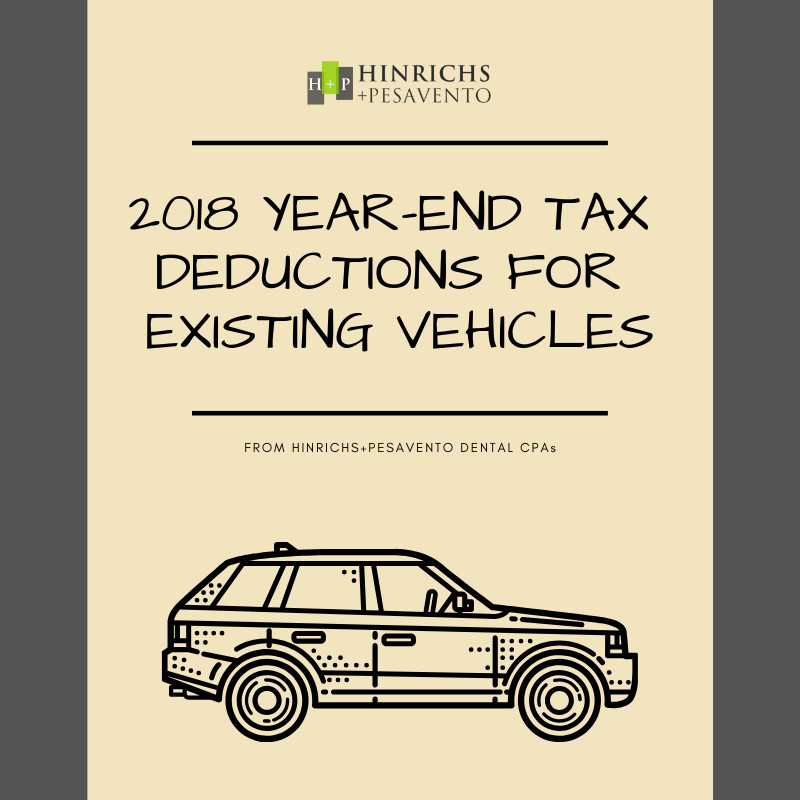It’s time to examine your existing cars, SUVs, trucks, and vans for some profitable year-end business tax deductions. Your first step is to identify your gain or loss on sale. Once you have the gain or loss, know these basic rules:
- Gains attributable to depreciation produce ordinary income.
- Gains in excess of original basis produce capital gains. (This is unlikely to happen on most business vehicles, but it can happen with classic and antique business vehicles because they can go up in value.)
- Losses on business vehicles produce ordinary deductions.
You report gains and losses on IRS Form 4797, which means those gains and losses travel outside of the business income and expense categories and thus have no effect on self-employment taxes. Now you have the basic rules. In general, at this time of year we suspect you are looking for vehicle loss deductions, so that’s where we will look. As with all year-end strategies, don’t wait! If you want the deductions this year, you need to complete the required action on or before December 31, 2018.
Take Your Child’s Car and Sell It
We know. This sounds horrible. But stay with us. What did you do with your old business car? Do you still have it? Is your child driving it? Or perhaps your spouse has it as a personal car. We ask because that old business vehicle could have a big tax loss embedded in it. If that loss is inside that old business vehicle, your strategy is easy. Take the vehicle and sell it to a third party before December 31 so that you have a tax-deductible loss this year. Your loss deduction depends on your percentage of business use. That’s one reason to sell this vehicle now: the longer you let your spouse or teenager use it, the smaller your business percentage becomes and the less tax benefit you receive.
Planning tip. Consider buying a replacement vehicle for your teenager or spouse before taking away his or her vehicle—this is not a tax tip, but a family harmony tip. If the old business vehicle would produce taxable gain, do nothing. You want the personal use percentage to continue to grow and reduce your ultimate tax bite.
Self-Employed? Use the Buy-and-Sell Strategy
All business vehicles have gain or loss on sale. The Tax Cuts and Jobs Act (TCJA) eliminated the tax-deferred exchange for vehicles. Now, the vehicle trade-in is nothing more than a sale of the vehicle to the dealer. Thanks to this new TCJA rule, many self-employed taxpayers will come out ahead because their trade-ins automatically take advantage of the buy-and-sell strategy
Here’s how the strategy works:
- The sale to a third party or the “trade-in sale” of your existing business vehicle produces a gain or loss that does not increase or decrease your self-employment taxes.
- The purchase of the replacement vehicle creates depreciation and, if elected, Section 179 expensing deductions. These deductions reduce your self-employment taxes. (Note: This is also true with IRS mileage rates because such rates include depreciation as a component.)
Takeaways
Your existing vehicle can produce last-minute 2018 tax deductions with one of the four strategies described in this article and summarized below:
- Did you give your old business vehicle to your child or spouse? Find out if that vehicle has a loss deduction inside it. If it does, take the vehicle away from your child or spouse and sell it so you can deduct the loss.
- Are you self-employed? If so, use the buy-and-sell vehicle strategy before December 31 to reduce both your income and self-employment taxes.
- Have you been trading in your old business vehicles on their replacements? If so, calculate your possible loss deduction now. You might find a big deduction.
- Do you or your spouse own a vehicle (new or used) that you purchased but never deducted for tax purposes? If so, convert that personal vehicle to business use to take advantage of the new bonus depreciation.
Ready to maximize your year-end tax deductions? Engage Advisors specializes in Dental CPA services and Dental Practice accounting. Contact us today to ensure you’re making the most of your business vehicle deductions before December 31st.

